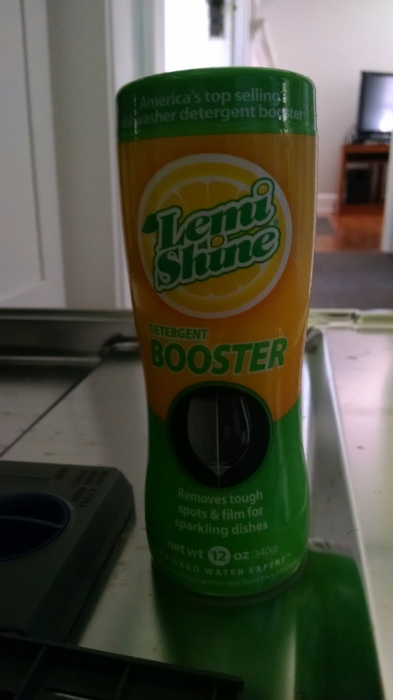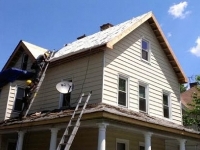Hard Water/White residue
Yes, our water here is VERY hard. A water softener is the long-term solution (which we still haven't done) but our trick for the dishwasher is a combination of all of the things you mentioned: rinse aid, a glug of vinegar in the bottom, and running the cycle on "high temp." That keeps our dishes largely residue-free. I also use Trader Joe's powder detergent and it seems to work well
We had the same problem in Maplewood. Here's how we solved it. First buy Lemi-Shine (its a detergent booster for dishes). I've only found it at Target. Next put Lemi-Shine in the pre-wash container in your dishwasher and put your regular dish detergent in the main wash part. Run dishwasher. Problem solved! We use Lemi-Shine in the pre-wash every time we run the dishwasher and have not had an issue since. Good luck!
Try to get a softener of some sort soon. The hard water will shorten the life of your boiler, water heater, and dishwasher.
These threads crack me up.
First, sacrifice a live chicken on the fourth Friday in February. Then dump 65 gallons of diesel into your dishwasher. Then throw away all your dishes and buy paper plates.
It's a water softener or find some glass magic (box of trisodium phosphate). They don't sell it anymore since phosphates were removed from non-commercial detergents so good luck with that. Come to think of it, you could also buy some commercial detergent if you know someone with a restaurant.
RobB said:
These threads crack me up.
First, sacrifice a live chicken on the fourth Friday in February. Then dump 65 gallons of diesel into your dishwasher. Then throw away all your dishes and buy paper plates.
It's a water softener or find some glass magic (box of trisodium phosphate). They don't sell it anymore since phosphates were removed from non-commercial detergents so good luck with that. Come to think of it, you could also buy some commercial detergent if you know someone with a restaurant.
Hahahaha! Oh, the South Orange water....we love it so.
We used glass magic until we got our water softener. HUGE difference - if you can get a water softener, do.
Btw, you can get trisodium phospate on amazon.
TSP is also available at Home Depot, Lowes or Buncher's Hardward in Millburn.
Thanks for the tips everyone. I figured a water softener was the solution but wasn't 100% sure.
This was my first post and I appreciate the helpfulinformation.
We never bothered with a water softener (have lived in SO almost 12 years). My biggest hard-water problem was with the dishwasher. For a number of years I used Glass Magic and then its Finish version until the phosphates ban. After Glass Magic became unavailable I had to search for a new solution and finally found one by doing all of the following when running the dishwasher:
- Pour about a cup of white vinegar into the bottom of the machine
- Use Cascade Complete detergent pacs (don't use liquid detergents, they don't work well in hard water)
- Make sure the rinse aid dispenser has rinse aid in it
- Run the water in the sink as hot as possible before starting the dishwasher
- Use the "High Temperature" option button on the dishwasher controls
If we do all these things faithfully, the dishes come out perfect. I have sometimes used Lemi-Shine in place of the vinegar; same good results. I don't find the extra steps to be a big deal.
The other effects of hard water don't bother me that much, except for all the white residue on my shower doors. I wish I'd known to squeegee after showering in the first few years after we had the shower doors put in... Looking forward to hopefully softer water when we change our water supplier at the end of next year, and glad we never spent the money on the water softener over the last dozen years...
@bluepool that's why we're still on the fence, because I know we're changing suppliers. For me the dishwasher thing is also not a big deal, I think we've got that under control. But the nastiness on my sink fixtures really bothers me. It's just not feasible to faithfully dry them all after every use in the kitchen and bathroom (especially with little kids!) and I don't know how to clean it well. Our house cleaner doesn't want to scratch the surfaces with a pumice, which I understand, but I need some kind of other solution!
I also assume a softener will help with dry skin in the winter which is another big annoyance.
Do we have any idea how "soft" the new water will be? We had a Portasoft rep out to test the current water on Friday. He said anything over 10 is considered "very hard" - ours was 23.
TarheelsInNj said:
@bluepool that's why we're still on the fence, because I know we're changing suppliers. For me the dishwasher thing is also not a big deal, I think we've got that under control. But the nastiness on my sink fixtures really bothers me. It's just not feasible to faithfully dry them all after every use in the kitchen and bathroom (especially with little kids!) and I don't know how to clean it well. Our house cleaner doesn't want to scratch the surfaces with a pumice, which I understand, but I need some kind of other solution!
I also assume a softener will help with dry skin in the winter which is another big annoyance.
Do we have any idea how "soft" the new water will be? We had a Portasoft rep out to test the current water on Friday. He said anything over 10 is considered "very hard" - ours was 23.
We just had a water softener installed on Fri. We got our own--a Whirlpool--and had a plumber install it. The plumber told us that our hot water tank was full, so it would take a few days for us to get the full effect of the softened water, but our showers are definitely better now--skin feels better, less of that filmy, oily feeling. We have all been getting dry skin in places we don't usually get dry skin, so hoping this will solve the problem.
I don't think it is really the issue of who is supplying the water, American Water or East Orange. My understanding is that the source of NJ water is well water, which is hard by nature, and has chemicals in it from underground runoff. We are also going to get a reverse osmosis filter installed under the kitchen sink, as there are so lovely chemicals in the NJ water--arsenic, for example, which doesn't leave your body.
relx said:
I don't think it is really the issue of who is supplying the water, American Water or East Orange. My understanding is that the source of NJ water is well water, which is hard by nature, and has chemicals in it from underground runoff. We are also going to get a reverse osmosis filter installed under the kitchen sink, as there are so lovely chemicals in the NJ water--arsenic, for example, which doesn't leave your body.
Maplewood water - from a different supplier than the current SO supplier - is not hard.
mjh said:
relx said:Maplewood water - from a different supplier than the current SO supplier - is not hard.I don't think it is really the issue of who is supplying the water, American Water or East Orange. My understanding is that the source of NJ water is well water, which is hard by nature, and has chemicals in it from underground runoff. We are also going to get a reverse osmosis filter installed under the kitchen sink, as there are so lovely chemicals in the NJ water--arsenic, for example, which doesn't leave your body.
As I said clearly in my post, I don't think it is the supplier, but the source.
"New Jersey American Water does not soften the water, because calcium and magnesium pose no
health problems and can promote stronger bones.
Conversely, removal of these components through advanced processes has the potential to increase
sodium levels in the drinking water, which could be harmful for those who have high blood pressure.
Softer water is also more corrosive and might shorten the life of your home plumbing."
As I said clearly in my post, I don't think it is the supplier, but the source.
"New Jersey American Water does not soften the water, because calcium and magnesium pose no
health problems and can promote stronger bones.
"The source" of EO Water is groundwells. "The source" of NJ American water is surface water. Surface water has fewer dissolved minerals in it, and is therefore naturally softer. NJ American water is not nearly as hard as EO Water.
TarheelsInNj said:
@bluepool that's why we're still on the fence, because I know we're changing suppliers. For me the dishwasher thing is also not a big deal, I think we've got that under control. But the nastiness on my sink fixtures really bothers me. It's just not feasible to faithfully dry them all after every use in the kitchen and bathroom (especially with little kids!) and I don't know how to clean it well. Our house cleaner doesn't want to scratch the surfaces with a pumice, which I understand, but I need some kind of other solution!
Try frequently spraying down the sink fixtures with slightly diluted vinegar. I keep a spray bottle with slightly diluted vinegar in both of my bathrooms.
jimmurphy said:
As I said clearly in my post, I don't think it is the supplier, but the source."The source" of EO Water is groundwells. "The source" of NJ American water is surface water. Surface water has fewer dissolved minerals in it, and is therefore naturally softer. NJ American water is not nearly as hard as EO Water.
"New Jersey American Water does not soften the water, because calcium and magnesium pose no
health problems and can promote stronger bones.
Not necessarily. Read this. Ignore the part about the discolored water, but read about the source of the water in the reservoir: The pertinent line:
"The local water supply is not just from the reservoir, and there are
interconnections to well and river water supply sources that are also in
used."
http://patch.com/new-jersey/maplewood/information-regarding-brown-discolored-water
We have had a water softener, leased from Jayson, for many years. Among its benefits are:
Hair is softer,
skin is less dry,
no white residue on dishes, utensils or glassware.
no scum on shower doors,
no green stains on bathtub.
no horrid crusty things on faucets,
longer life for appliances, eg, washers, dishwashers, refrigerators,
laundry is cleaner, softer, easier to fold and less wrinkled,
no messing with vinegar or other chemicals,
plumbing lasts longer,
life is a little easier.
I thought I read that water softener water would kill fish if used in aquariums, is that true
A long time ago, the boys had fish (both houses) and we've never had a problem with hard water. I use to test the pH with those little strips and add whatever needed to be added to balance it out.
I now use Cascade and Finish and always use about a 1/4 cup of white vinegar in my dishwasher. I even use vinegar in my laundry (not for hard water, just to brighten up whites and make sure linens/towels are cleaner).
our fish are fine with hard water, but I am thinking of getting a water softener, and am wondering if softened water is a problem
We recently installed a water softener (Fleck 7000 SXT, 48k grain capacity), and it makes a huge difference. I swear the soft water also fixes fixtures that were getting gummed up with scale.. I wish I had done this much earlier.
Downsides:
- The equipment is about $600, not including and plumbing work and cost of installation. Tip: install a tee before the software that you use for garden/lawn irrigation.
- To regenerate the resin, it consumes salt (ours regenerates every two weeks roughly), which costs maybe $5-10 per month.
- The regeneration cycle also uses water, which goes into the drain and is waste.
- The salt also very slightly increases the salinity -- something to be aware of if you have to watch your sodium intake (on the other hand, our water comes seasoned!
 ). I can imagine some fresh water fish don't like that.
). I can imagine some fresh water fish don't like that. - If slightly saline water is a problem for you, you could consider installing a non-softened (but perhaps filtered) faucet in your kitchen.
carolanne said:
our fish are fine with hard water, but I am thinking of getting a water softener, and am wondering if softened water is a problem
There are many conflicting opinions about this based on a simple Google search.
One excellent point made is that the softener should be located at a point in the home plumbing such that it does not soften water to be used outdoors at hose bibs - no use in softening water that's just going to end up in the garden. If you are that concerned about the fish, you could fill and refill the tank with water from the outside hose bibs.
jimmurphy said:One excellent point made is that the softener should be located at a point in the home plumbing such that it does not soften water to be used outdoors at hose bibs - no use in softening water that's just going to end up in the garden.
On top of that, you don't want to water your plants (on pots, garden or pots) with water softened with sodium chloride. It's terrible for your soil and for plant life in general. The best solution is to leave your outdoor faucets unconnected to your house softener. If that's not possible, use potassium chloride tablets (which are 2x expensive as sodium chloride tablets).
Employment Wanted
Latest Jobs
Employment Wanted
-
Our amazing driving nanny is available for work.
Apr 28, 2024 at 8:05am
-
(No Fees) Hire A Baby Nurse Here for Your New Borns! (732)-737-7165
Apr 27, 2024 at 1:46am
-
(NO FEES) Hire A Fresh Energetic Nanny/ Housekeeper Here ! (732)-737-7165
Apr 27, 2024 at 1:46am
-
(NO Fees) Hire Housekeepers Here! ( 732)-737-7165
Apr 27, 2024 at 1:46am
-
(No Fees) Hire Home Health Aides Here! (732)-737-7165
Apr 27, 2024 at 1:46am
-
Summer Private Speech Therapist
Apr 26, 2024 at 9:12pm
-
Apr 26, 2024 at 1:58pm
-
(Classic Painting and Materials) Fair Prices. Spring and Summer Specials
Apr 25, 2024 at 5:14pm
Help Wanted
-
Part Time help for special needs young adult
Apr 27, 2024 at 4:43pm
-
Apr 25, 2024 at 6:15pm
Lessons/Instruction
Sponsored Business
Promote your business here - Businesses get highlighted throughout the site and you can add a deal.
























I have recently moved to South Orange and am having a problem with (what I think is) hard water. We have a brand new dishwasher that was never used prior to us moving in and it always leaves a layer of white residue on glasses, pots and mugs. I have tried changing detergents. I have tried rinse aid. I have even tried an old trick where you leave a cup of white vinegar in the top rack during a cycle. Nothing has worked. Does everyone have this problem? Any suggestions or thoughts would be appreciated.